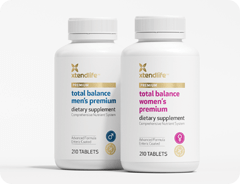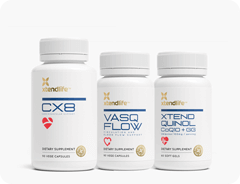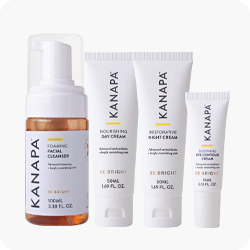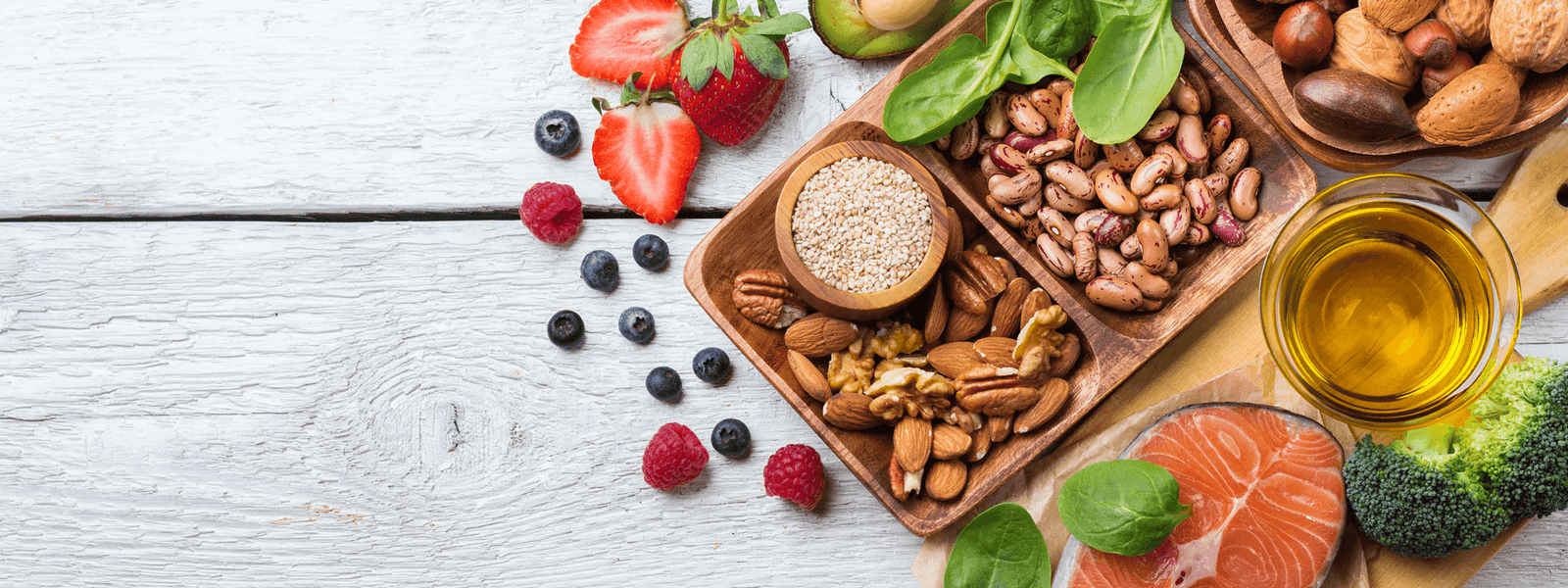If you follow the science of aging, you will most likely have heard of a molecule called nicotinamide mononucleotide, or NMN for short. NMN is a molecule that is related to nicotinamide riboside chloride (NR), the hero ingredient in NR6. You can think of them as being like cousins - more on how they are related below.
Like NR, NMN is a precursor to NAD+.
In this article, we'll give you the rundown on the current state of knowledge about how NR stacks up against NMN.
Unlike most companies that are in the NAD+ space, our journey to launching an NAD+-boosting product has been unbiased. Meaning, we did not hold commercial bias towards either NR or NMN. Because of that lack of commercial bias, we were able to assess the research behind NMN and NR based purely on the quality, quantity, and strength of the research.
It's worth noting that research on both NMN and NR is moving quickly, with dozens of clinical trials underway and studies published frequently. Like the science behind these fascinating and important molecules, Xtendlife's journey with NAD+ boosting ingredients continues as we keep a very active eye on the research.
NMN and NR Are Like Cousins
NMN is identical to NR except that it is much bigger. In chemistry-speak, NMN has a phosphate group attached to its side, whereas NR does not.
Molecular Size Matters
When it comes to molecules, size matters! This matters because it affects whether the molecule can get across the gut barrier and into our cells.
There is considerable debate about how NMN gets into our bodies. It was originally thought that to get into cells, the phosphate group on NMN had to be removed, effectively turning it into NR which can easily cross cell membranes.
Then, in 2019, another mechanism for NMN to get into cells was identified. Research showed that there is a transporter - a bit like a bus - that can take NMN across the gut. The catch? It has only been identified in mice. At this stage, it is not known whether such a transporter exists in humans. To make matters worse, some scientists have openly questioned the results of that research.
The issue of exactly how NMN gets into cells is still hotly debated. On the other hand, there is ample evidence showing NR enters cells. So that's a win for NR and a 'watch this space' for NMN.
There Is More Research on NR
When we formulated NR6, there was only one published clinical study on NMN. That study was published this year (2021). In this study, researchers tested three different doses of NMN (100mg, 250mg, and 500mg) on 10 healthy men. Each dose was taken as a "one-off" (i.e. not ongoing). They found that NMN was well tolerated with no serious side effects. However, on closer inspection, we found an interesting and potentially troubling result.
There was a 51.3% increase in serum bilirubin levels in the volunteers after taking NMN. You may be familiar with bilirubin; it's a blood test that's used to help find the cause of health conditions like jaundice, anemia, and liver disease. The increase was considered to be within the 'normal' range for serum bilirubin - suggesting it may not be a problem.
However, it's the unknown that is concerning. In this clinical study, the volunteers' blood samples were only monitored for 5 hours after taking NMN. It's possible that the elevated bilirubin levels would go back to normal after a day or so. It's also entirely possible that bilirubin levels would keep rising or become even more elevated if the person took NMN every day (as opposed to just a "one-off" dose). This study did not even measure levels of NAD+ after taking NMN.
The lack of research on NMN contrasts with that on NR.
A search of the Clinical Trials database that is administered by the National Institutes of Health in the US, reveals 21 completed clinical trials on NR, with a further 29 either underway or soon to be underway. There are at least nine clinical studies demonstrating that taking NR results in an increase in NAD+.
However, the pace of research is picking up with NMN and we note that several clinical studies have in fact been published in the last month.
The combined total of 21 clinical trials indicates a very robust safety profile for NR. This is one of the main reasons we chose NR over NMN. So that's another win for NR, and another 'watch this space' for NMN.
NR Has Regulatory Approval, NMN Does Not
The regulatory approval process for new ingredients in jurisdictions such as the US and European Union (not to mention Canada and Australia) is very rigorous.
Companies wanting to market their new ingredient must prove that their ingredient is safe. They submit a huge dossier of information which is then reviewed by a panel of experts. The review process itself can sometimes take years and many such applications fail.
NR has passed this approval process in the US, the European Union, Canada, and Australia (note New Zealand does not have this regulatory approval process). In contrast, NMN does not have regulatory approval in any country that we are aware of. Recently, the Chinese Government even went so far as to issue a warning stating that the sale of NMN is illegal.
Obtaining regulatory approval is yet another area where NR wins over NMN.
Research Tells Us, NR Wins
We reviewed the research, we read the studies, and we re-read them. We drew charts, we compared, and we made our choice. We were not influenced by commercial bias. We chose NR instead of NMN because of its robust safety profile and a greater level of proof that NR does indeed increase NAD+ levels. We were also concerned about the lack of regulatory approvals for NMN.
Your choice comes down to whether you are willing to take a product (NMN) that has only just recently started being tested in humans. At this stage, it is too early to tell whether NMN will turn out to be safe and effective. What we can tell is that NR has an excellent safety profile, is approved for sale, and is proven beyond a shred of doubt to increase levels of NAD+.
We're confident that in NR6 you are getting the best NAD+ booster on the market today!
NR6 - Natural NAD+ Booster
A synergistic combination of advanced ingredients to support cellular energy and optimal NAD+ level.
Shop now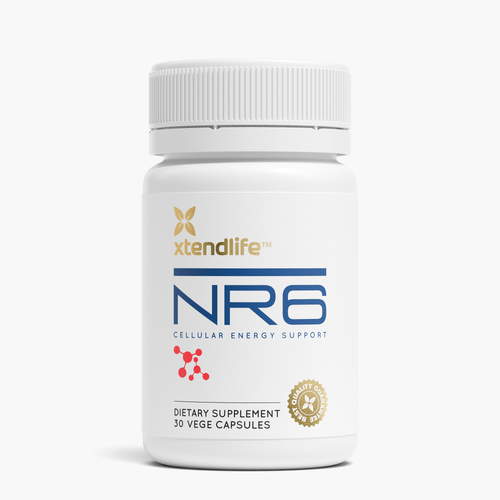
References
- Irie, J. et al. Effect of oral administration of nicotinamide mononucleotide on clinical parameters and nicotinamide metabolite levels in healthy Japanese men. Endocrine Journal. 2020, 67 (2), 153-160.
- Schmidt, M. A. and Brenner, C. Absence of evidence that Slc12a8 encodes a nicotinamide mononucleotide transporter. Nature Metabolism. Vol 1, July 2019, 660–661.
- Conze, D., et al. Safety and Metabolism of Long-term Administration of NIAGEN (Nicotinamide Riboside Chloride) in a Randomized, Double-Blind, placebo-controlled Clinical trial of Healthy overweight Adults. Nature. (2019) 9:9772.
- Martens, C.R. et al. Chronic Nicotinamide Riboside Supplementation Is Well-Tolerated and Elevates NAD+ in Healthy Middle-Aged and Older Adults. Nature Communications. (2018) 9:1286.


 Supplements
Supplements Bundles
Bundles